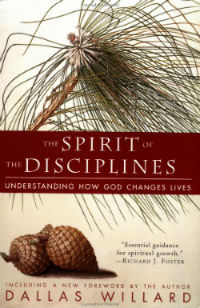 Most of the great theologians stopped to meditate on Christian living.
Most of the great theologians stopped to meditate on Christian living.By Neil Earle
Summer’s here, and it's not quite as easy these days as when they sang about it in “Porgy and Bess.”
Still, this is a season when most of try to spend more time with nature – in the garden, at the beach or even (cross your fingers) on vacation. This “could” be a time when we have a little more leisure and space to practice the spiritual disciplines.
The Spiritual Disciplines – what are these?


There's a good summary in The Divine Conspiracy or The Spirit of the Disciplines by Dallas Willard (pictured, left). Willard died very recently but was considered an authority on the subject. Here’s part of his list:
One incentive for prayer is not to approach God with a “laundry list” but to list instead the blessings we have experienced recently. That is a strong lubricant for richer prayer. “Enter his gates with thanksgiving and his courts with praise. Give thanks to him and praise his name” (Psalm 100:4).
Wise old John Calvin wrote: “Even if this life is only a vestibule (to eternal life), we ought to make such a use of its blessings that we are assisted rather than delayed in our journey.” This summer my nephew is getting married, which necessitates a 3500 mile journey on our part. I am already celebrating this event in advance and unless I miss my guess, will mull it over later as a highlight. We must appreciate God’s blessings.
 Most of the great theologians stopped to meditate on Christian living.
Most of the great theologians stopped to meditate on Christian living.We’re currently in the age of Christian fads. Our theology is so weak that we can put things on bumper stickers that pass for profound wisdom. Spirituality by Slogans. One is "Just ask, What Jesus would do." Another is: “The Bible says it. I believe it. That settles it.”
How do we live the truly Christian life i.e. being salt and light to the people we meet? Just asking what Jesus Christ would do is not enough. You have to be in training, in the game, like an athlete. You won’t really know what to do in a given situation unless you know what Jesus did and that means taking the time to read his story, not just once, but repetitively knowing it is the Master's Manual for the Christian life we all aim at.
When you’re in spiritual training the right responses to life begin to flow out of us from the work of the Spirit inside (Romans 5:5). When we have the model of Jesus before our eyes, greeting people the way he would, then we don’t need to ask "what Jesus would do."
But you’d have to be regularly reading the Gospels to keep that image fresh. Otherwise the images we carry are from ESPN or (perish the thought!) CNN.
The great Christian leader St. Paul wrote on what he called “godliness,” living like God. He said in 1 Timothy 4:8: "For bodily exercise profits a little but godliness is profitable for all things."
He added in 1 Corinthians 6:13: “The body is for the Lord.” That’s a challenge Paul sets out here, to align our physical selves with the spiritual life as Jesus surely did in his times of heroic fasting and prayer – 40 days and nights. Jesus spent his life expending himself ceaselessly, healing individuals who came his way, training and retraining his often obtuse disciples, taking time to praise Roman officers and despised lepers and Samaritans.
Ye he still found time to be alone (Matthew 14:22-23).
That’s why when St. Paul was first drafted into Christ’s service he did not go up to Jerusalem or confer with the other apostles right away. He went into out into the desert, to seek God in silence and solitude. “But when it pleased God, who separated me from my mother’s womb, and called me by his grace, to reveal his Son in me, that I might preach him among the heathen; immediately I conferred not with flesh and blood; neither went I up to Jerusalem to them which were apostles before me; but I went into Arabia, and returned again unto Damascus” (Galatians 1).”
Jesus, also, constantly sought solitude. Remember, after baptism he went to the wilderness. As his life neared its crisis point, he retreated from busy bustling Jerusalem to Gethsemane. He would withdraw from the crowds, seeking time for prayer so as to strengthen his relationship with God (Mark 1:35-37).
Here’s a man with his priorities crystal clear! Just hearing about the spiritual disciplines can be a prod to begin thinking about implementing them in our lives. When we do we enjoy the promised reward – abiding in Christ means life, and life more abundantly (John 15:1-8; 10:10).
And who doesn't want that?